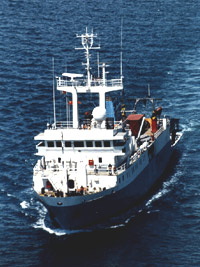 |
 |
 |
 News Around the Republic of Mexico | March 2005 News Around the Republic of Mexico | March 2005  
Mexico Suspends Permit for Controversial U.S. Research Ship
 Alistair Bell - Reuters Alistair Bell - Reuters


| Environmentalists argue that the technology could harm sea life, including whales, which use sound waves to communicate..

|
Mexico City - Mexico announced Friday it has suspended permits for a U.S. research vessel conducting sound-wave experiments in the Gulf after the ship ran aground on a coral reef and damaged it.

Mexico's Environment Department said the U.S. ship Maurice Ewing must stop the research voyage until it pays for damage done to underwater rock formations and coral about 30 miles off the Yucatan peninsula in the Monday accident.

"This is a precautionary measures to ensure the ship pays the damages and fines," said Attorney General for Environmental Protection Jose Luis Luege.

Officials with Columbia University's Lamont-Doherty Earth Observatory, which is in charge of operating the Maurice Ewing, had no immediate comment.

The ship is using the underwater seismic pulses to explore the Chicxulub Crater, a depression about 120 miles wide just outside the port of Progreso, 190 miles west of Cancun. Experts believe a comet or asteroid carved the crater 65 million years ago, coinciding with the mass extinction of species, including the dinosaur.

Environmentalists welcomed the halt to the ship's activities. The argue that the technology could harm sea life, including whales, which use sound waves to communicate.

"We have to make fun of modern, sophisticated ship that has technology capable of registering every bump on the sea floor, but which can't even see a reef," said Araceli Dominguez of the Mayab Ecological Group. | 
 | |
 |



